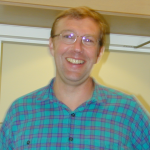Bruce Tempel, Ph.D.
In Honor & Memory

Bruce Tempel, Ph.D.
Dear Friends and Colleagues,
With great sadness, we are writing to inform you that our friend and colleague Bruce Tempel died Saturday due to complications from Alzheimer’s Disease. Bruce was 65 years old and had been
living in Bozeman, MT for the past couple of years, where Sarah Shannon and his daughter, Flora Tempel, took care of his needs and oversaw his medical care. We all thank Sarah and Flora.
Bruce grew up in Eastern Washington and attended college at Pacific Lutheran University, where he became fascinated by how genetic variation shapes the biological world. After earning his PhD at Princeton studying behavioral genetics of learning in drosophila, Bruce completed a short postdoc at George Washington University, and then moved to the laboratory of Lily and Yuh-Nung Jan at UCSF. There he played a major role in cloning the Shaker potassium channel and then the first mammalian voltage-gated potassium channel, also studying several additional potassium channels. In 1988 Bruce joined the Departments of Medicine and Pharmacology at the University of Washington and set up a lab at the Seattle VA Medical Center, where he studied the genetics, physiology, and functions of mammalian potassium channels. In 1995 he moved to UW Medical Center as Associate Professor of Otolaryngology – Head & Neck Surgery and Pharmacology, being promoted to Professor in 2001. In 2011 Bruce became Director of Research for the Department of Otolaryngology – Head & Neck Surgery, and he continued in this position until his retirement in 2017. Bruce developed an outstanding, well-funded, highly collaborative and internationally respected research program integrating genetics and physiology at the cellular level with complex behavior, mostly focusing on how the brain decodes acoustic information to localize sound. He was sought after as a speaker and as a mentor, serving as primary mentor for 15 PhD students and 18 postdoctoral fellows. His collaborations included investigators across the country and around the world.
Those of us who worked and played with Bruce remember him as a generous, warm colleague and friend. He never refused to take on another responsibility, or to share knowledge, resources or help. Bruce’s salmon dinners for family, friends and colleagues were legendary. Most of all he was a person without guile, kind, nonjudgmental and generous in word and deed.
We will miss him greatly.
